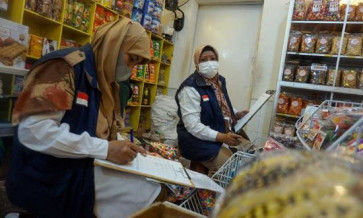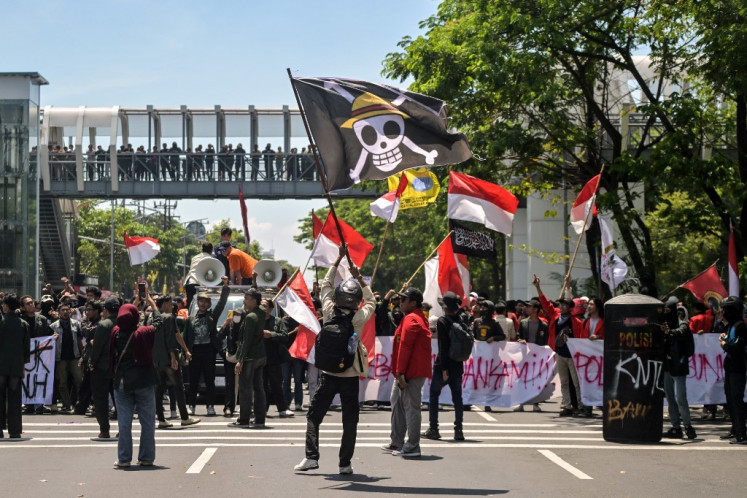Popular Reads
Top Results
Can't find what you're looking for?
View all search resultsPopular Reads
Top Results
Can't find what you're looking for?
View all search resultsBahana: 1998 vs 2008: A tale of two crises, their impacts on Indonesia
While there are similarities between the 1998 Southeast Asian financial crisis and the current 2008 global financial crisis, the actual impacts on Indonesia are very different
Change text size
Gift Premium Articles
to Anyone
While there are similarities between the 1998 Southeast Asian financial crisis and the current 2008 global financial crisis, the actual impacts on Indonesia are very different.
Both crises resulted in rupiah depreciation, but this time around, there is hardly any benefit for Indonesian exporters as global demand plunges.
10 years ago, Indonesian exporters did well on strong demand coming from Japan (22 percent of Indonesia's total exports), Singapore (11 percent), the then 17 nation EU (10 percent) and the United States (10 percent). Today, the five main exporters, which make up 62 percent of Indonesia's total exports, are facing severe economic slowdown with three -- Japan, Singapore and most of the European Union -- officially in recession.
We expect greater casualties as the U.S. and other EU countries not yet in recession may also go into recession shortly.
Those who think the weakness of the rupiah will help the country's exporters need a reality check. Based on various media reports the sectors which are currently experiencing the most layoffs are in fact the export sectors (i.e. CPO, furniture and textiles).
Key problems facing exporters include not only declines in volumes, but also lower prices. Commodity exporters must deal with falling prices with the likes of CPO, nickel and oil having come down more than 60 percent from their recent peaks.
On the other hand, those in the garment business for example, are seeing their total orders decline in value as overseas consumers are forced "trade down market" into cheaper and more basic clothing given the current economic downturn.
According to garment exporters we talk to, this "back to basic" mode has resulted in a 30 to 40 percent decline in their export values in U.S. dollar terms, excluding volume drops which are likely to escalate going forward.
In other words, the drop in currency has not been sufficient to offset falling prices coupled with the lower volumes met by our exporters.
Finally, in 1998, only the Southeast Asian countries had to confront weakening currencies and this facilitated their products to be priced more competitively in export markets. Today, with the exception of the yen (table 2), virtually all other currencies have weakened against the U.S. dollar.
Thus, the 36 percent rupiah depreciation in the past 15 weeks does not make Indonesian exports more competitive globally.
Having said that, we call for an all out government effort to support the rupiah. Recently the government changed its currency policy to make it more difficult to buy foreign exchange, requiring any purchases of US$100,000 or more to be supported by underlying transactions in goods or services.
Unfortunately, the move did not halt the slide of the rupiah which has now breached the 12,000 to the dollar level. Although unintended, in our view the government's efforts to curb speculation probably did more harm than good by stoking market fears of potentially greater convertibility risks ahead.
With the current crisis of confidence, we believe it is high time for the government to provide the much-debated full blanket guarantee for banks to cover all deposits and interbank loans. This in our view should be also followed by a cut in tax on rupiah deposits from the current 20 percent to 10 percent.
It does not matter that the government does not have enough to cover the Rp 1,600 trillion in total deposits, as we do not foresee every Indonesian sleeping with his or her money under the bed. It is all about confidence so that depositors do not have to second guess which banks are safe to park their cash, preventing the flow of funds from smaller to bigger banks.
Data from Bank Indonesia in September shows that deposits of third party funds at three state-owned banks increased more than Rp 40 trillion ($3.2 billion) in September 2008.
Unless the fall of the rupiah is arrested now, a second financial crisis could unfold for Indonesia, mirroring what occurred in 1998 -- a literal example of how history could indeed repeat itself.
The writer is the senior vice president and head of research at Bahana Securities










